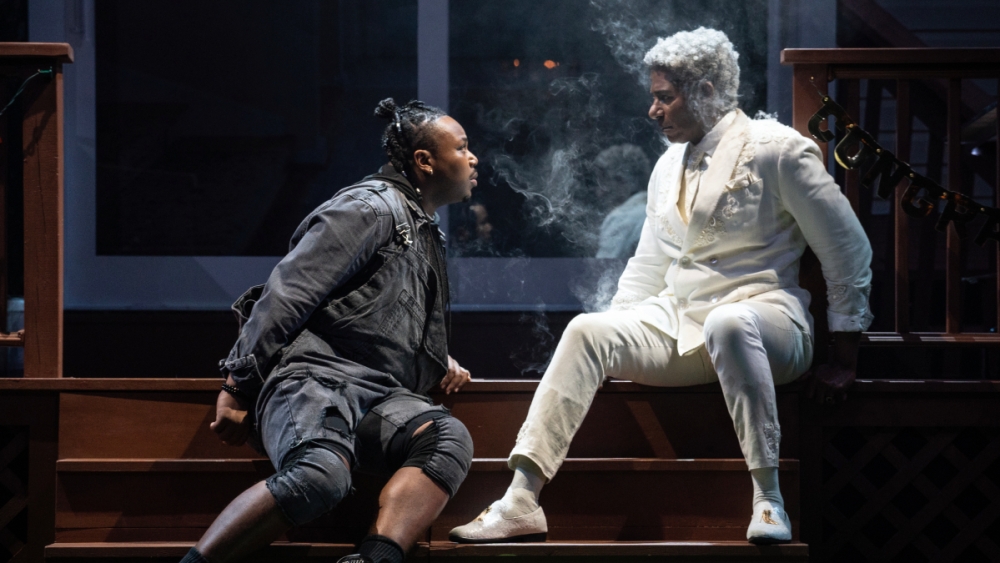‘Fat Ham’ Review: James Ijames’ Pulitzer Prize-Winning Play on Broadway
New York stages are rarely without some version of Shakespeare’s mopey Danish prince, tormented by fatal family drama. But none has ever been quite like the protagonist of “Fat Ham,” Juicy, who is described by the playwright James Ijames as “gloriously and beautifully soft in both body and temperament.” Something is rotten in Juicy’s world, which, like Hamlet’s, pulses with violence, desire and scrutiny over the nature of existence.
But this is also a classic cookout, where bloodspill is generally limited to the slaughtered hog on the grill. Not to mention that “Fat Ham” is a total gas — the funniest and most invigorating new show on Broadway, where the acclaimed Public Theater production, co-produced with National Black Theatre, has opened after an Off Broadway run last year. Winner of the 2022 Pulitzer Prize, “Fat Ham” recasts its source material to imagine what Shakespeare did not — how people might overcome circumstances, expectations and their own demons to forge new paths through life.
Tragedy would seem to be part of Juicy’s inheritance: His father killed a man for having bad breath; his uncle killed his father to marry his mother; and now his father’s ghost is demanding that Juicy avenge him. Familiar stuff, but one look at Juicy, played to downbeat, emo perfection by Marcel Spears, and it’s clear the only thing he’s going to slay is Radiohead’s “Creep” on the karaoke machine. His softness isn’t a weakness, though, but a shift in energy and temperament that’s essential to breaking the cycle.
The exuberance of director Saleem Ali’s production likewise signals that its brisk and color-saturated 90 minutes are unlikely to end in a body pile. (The set, like a Kodak photo peeled from a family album, is by Maruti Evans.) The play opens with Tio, a philosopher-fool played with goofy depth by Chris Herbie Holland, watching OnlyFans porn on his cell phone, setting a dual carnal and comedic tone. As Juicy gussies up the backyard for a makeshift wedding reception — with a clearance aisle’s worth of decorations for other occasions — the mourner’s relations begin to orbit.
Ijames handles with special care the connection between Juicy and his mother Tedra (Nikki Crawford, irrepressibly country with a touch of blues), forging their allegiance into an anchor for Juicy’s dark night of the soul. (The bedazzled shirt she bought him to wear at the party reads “mama’s boy”; the fantastically vivid costumes are by Dominique Fawn Hill.) His uncle Rev and his father’s ghost (both played with gnarled lip by Billy Eugene Jones) equate masculinity with brutality, ridiculing him as a sissy.
Juicy at least finds allies in his generational peers, all of whom are “figuring shit out” while bucking what’s expected of them. Opal, a huffy but tender Adrianna Mitchell, frowns beneath the frills she’s forced to wear by her mother Rabby (Benja Kay Thomas, taking everyone to church), and shares Juicy’s search for an alternative way to be. Her brother Larry, a bottled-up marine played by Calvin Leon Smith, admires in Juicy exactly the qualities that repel his male elders. And it’s Tio who articulates, via a showstopping, cannabis-fueled hallucination about gingerbread and blowjobs, what all of them ultimately want — a world where they’re able to choose pleasure over harm.
The brilliance of Ijames’ play lies in its manipulation of a canonical text in service of imagining Black futures and positing radical possibility where others see only foreclosure. The queerness that blooms as the story goes is pivotal, not just as it pertains to characters’ sexuality but to Ijames’ approach to aesthetic and form. Because “Fat Ham” is at its most thrilling when it ventures furthest away from its inspiration. “Hamlet” diehards may either delight or struggle to map its particulars onto “Fat Ham,” but they’ll be missing most of the fun.
Indeed, the play’s most obvious “Hamlet” winks and callouts, from puns to a few direct quoted passages, cede Ijames’ voice more than is necessary. The playwright’s own prose is lean and precise, with a vibrance of rhythm and association that hardly needs any supplementing. You could pull up to this barbeque with no prior knowledge of the Bard and be very well satisfied. The synergy between Ali, Ijames and the nose-to-tail extraordinary cast are more than enough for a feast.

